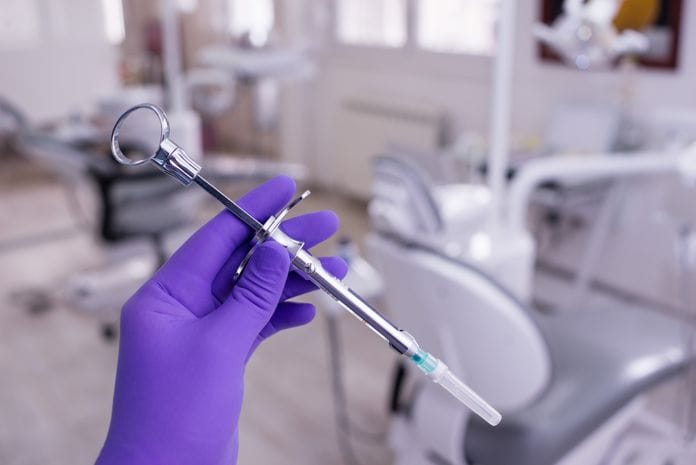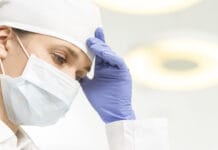Anesthesia is the most feared part of a dental visit. Patients express their fear of the needle the instant they walk in the dental office, even if they are only there for routine prophylaxis. Daily, in private practice, I am asked if the patient “will be getting a shot today?” Sure we have been taught decreased fear strategies while in school or have anxiety reducing equipment in the office. For example, my office offers a chair that heats and massages, televisions on the ceiling, and nitrous oxide gas. Our dental assistants each have their own distraction techniques; one blows air on the patient’s neck and talks about having drinks on the beach. Another holds the patient’s hand and rubs it gently and tells them to take deep breaths. These are all things that make the process of anesthetizing more comfortable and less stressful for a patient. However, the best we can do for our patients is utilize the accuracy of the techniques we were taught in school.
I have the pleasure of being an adjunct instructor at my local community college’s dental hygiene program.
I instructed in the pain control lab last year; this sharpened my skills at giving anesthesia for my patients. I have been a hygienist since 2006 and an instructor since 2016; I never stop learning. Most hygienists go through pain control in school and then maybe utilize their skills once in a while in private practice, and only when doing periodontal therapy. I was one of those hygienists. The first office I worked in out of college didn’t deal much with periodontal therapy, and the doctors preferred to anesthetize the patients themselves.
After working in that office for years, I moved on to a newer practice. Here I was asked to help anesthetize if the doctor was running behind or working with another patient. It was rare, but more so than I had done in the past. I found myself referring to textbooks and notes from school and seeking continuing education on anatomical landmarks, pharmaceutical interactions, and dosage protocols. These were skills and information that were lost to me from not having been routinely utilized. Currently, I am working in an office that runs differently. We increased our 50 minute prophylaxis time to 60 minutes, and as hygienists, we are able to utilize our anesthetizing skills more frequently.
With the time increase, our duties within that allotted time increased as well.
Our office has amped-up our periodontal protocol. We are paying more attention to exposing radiographs at regular intervals. We are educating the patients more; spending more time with models, booklets, and video education modalities. We are now expected to anesthetize, titrate nitrous, and perform periodontal probing in the doctor’s column when needed. I am often anesthetizing the first patients of the day before our doctors have even had time to fall behind or work on something else.
I have found a whole new appreciation and education for pain control. With working as an adjunct instructor, I am in complete control over my skills and knowledge of pain control. I pride myself on taking these skills that we teach our dental hygiene students to utilize in comforting our dental patients in my own clinical work. It humbles me to know that there are patients that would rather I anesthetize, over the doctor that will be completing their restorative work that day.
This pride I feel does pose a question.
Should I be compensated more for my added duties? Sure, I am licensed to give anesthesia and administer nitrous oxide. No, anesthesia is not considered production itself, as it is an included part of dental treatment. I am not gaining or decreasing mine or my doctor’s production by removing myself from my column of 60 minutes for my patient’s prophylaxis, radiographs, periodontal probing, education, and examination; but I am helping to increase the doctor’s productivity. Is it any different than my doctor walking away from his column to come into my column for a 10-minute examination, which is then billed out for $30 or more, which goes into his daily production? If I leave my column to go to his patients for 10 minutes, I do not gain daily production. How do we determine if I should be compensated for my time? I am sure some practices do bill for nitrous or anesthesia, but it is not common practice where I live. These are incorporated into procedures for comfort, but they are figured into the doctor’s time.
This poses a question of how hygienists are paid and can be a completely separate article. However, I would like to break it down here a little bit. Currently, at my job, I am paid hourly, which is the norm for most hygienists in my area. I do not receive any incentives or bonuses. I am offered a raise at yearly reviews if I have earned such, based on performance or whatever else my doctor deems raise-worthy. My previous employer paid a base hourly wage plus a production percentage. I received 15-19% over the years of the production from my column that were services rendered and charged out by me. These include prophylaxis, radiographs, fluoride, sealants, whitening trays, etc. Anesthesia was not billed separately, therefore not included within the production bonus. I honestly liked this method of compensation for my job. It gave me more drive to educate on whitening or take a little extra time to take impressions, instead of finishing a patient early to chat with a coworker in the back. I knew that my paycheck would increase with those extra services. Don’t get me wrong; I am far from a production-driven clinician, I am an educator.
So this brings me back to my initial premise, should a hygienist be compensated for providing anesthesia or titrating nitrous away from his/her chair. If you break it down, it does increase the doctor’s production. The front office could schedule less time for the doctors in their columns; time that was given for anesthetizing, therefore allowing for more procedural time. More time for procedures would boost daily production with less downtime per doctor. However, by my helping the doctor gain more time for other things, I am also gaining more of his time to perform my examinations, therefore, helping to keep my schedule running on-time. This plays a very important role in team dynamics and the inner workings of a “team” oriented dental office.
As a team, I do believe that an increase in production should increase worker compensation.
However, it is hard to measure how much production is increased by hygienists anesthetizing for their doctors. There isn’t an easy way to track the monetary result of this, which is more than likely the reason we do not seek compensation for such practice.
I will continue to provide this service in my office as part of my license for the over-all positivity it provides. We work together as a team, and our patients are very aware of the roles played by the office staff. I do think this is what makes my current office a great place to work. I do hope other offices utilize their skilled hygienists in this way, and it would be great if doctors realized the overall production increase as a result. It is also a great way to keep skills in place that are often lost from hygiene school.
We are taught to be great clinicians and known for the important preventive care we provide. The increase in the great care we provide leads to increased production, and the more respect we will receive from our dental community as hygienists. It all comes full circle.












